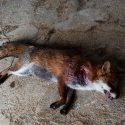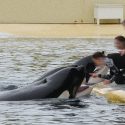Drugged cats abandoned on a road: One Voice will be present at their persecutor’s hearing in Montauban
Drugged cats abandoned on a road: One Voice will be present at their persecutor’s hearing in Montauban
31.01.2024
France
Drugged cats abandoned on a road: One Voice will be present at their persecutor’s hearing in Montauban
Domestic animals
They were called Filou, Flash, Garfield, Panda, Pépito, Perle, Picasso, Sacha, Vanille, and the last one had not even been named. One night during the summer in 2023, they were spinelessly abandoned on a small road between the fields and forest after having been drugged. Only four of the ten cats were able to be saved by firefighters and town services, but two succumbed to their injuries. The six others were never found despite extensive searches.We are demanding justice for them. We are pressing charges at the hearing of their former so-called family at 1:30pm on 6 February at the Montauban legal tribunal.
Pictured: Panda and Pépito
At the end of June 2023, our partner, the Chats Libres de Mélie Association [Mélie Free Cats Association], was contacted to organise the ‘transfer’ of ten cats and kittens to a family in Occitania. After making the link between a phone call and the sordid misdemeanour, he asked us to give them a voice.
Animals are the first victims of humans’ irresponsible behaviour
In the middle of summer, when the rescue centres are saturated with homeless residents, a solution was in fact proposed to the said family wishing to separate the ten cats as quickly as possible: five could be taken in immediately, then the other five two weeks later. As usual, volunteers create more space and sort things out to welcome unfortunate animals in an emergency for oblivious people to whom we still have to explain that animals are living beings and not objects that we get rid of if they think they have become too cumbersome.
The proposal was refused at all costs by these people wanting to separate the animals immediately and without the slightest bit of effort: they preferred to abandon them, at the very likely risk that this would lead to their death. A late hour (it was June), a road that is rarely frequented, some Lexomil: the “perfect” cocktail to get rid of the cats.
The only solution is neutering
Today, only Panda and Pépito are still alive, silent witnesses of the ordeal that they lived through that night. Neither microchipped nor neutered, it is a happy set of circumstances that allowed the cowards behind these two deaths and six disappearances to be identified. Perhaps those who disappeared survived and are now subjected to the miserable life of stray cats, perpetuating the endless cycle of suffering.
Those who breed their animals and distribute the babies everywhere are initially responsible for this misery. Internet trafficking, mass slaughtering in pounds, the collapse of biodiversity: what is the State waiting for when it comes to making this simple surgical operation obligatory, like in Belgium or Spain? Our leaders also have a role to play. Impunity and a lack of awareness of solutions are what allow these problems to be repeated.
For these acts, the elements of which constitute an aggravating circumstance, we will be present at the Montauban legal tribunal on 6 February at 1:30pm to request an exemplary punishment and for these perpetrators to be banned from keeping animals. Join our fight by insisting on the implementation of an urgent plan for stray cats.
Translated from the French by Joely Justice









